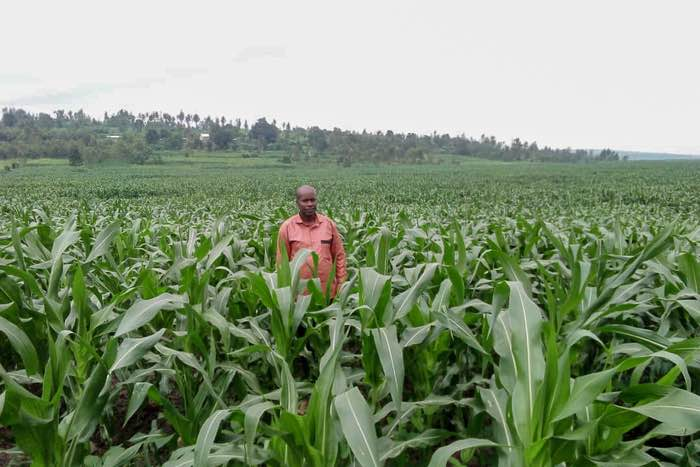
Forced to flee his native village in South Kivu of the Democratic Republic of Congo (DRC) in 2008, Jean-Paul Runezerwa, 43, settled in Nyabiheke refugee camp in the eastern part of Rwanda.
Initially, adjusting to life in the camp was a challenge for Jean-Paul until he began farming at Nyabicwamba marshland near the camp. Since then Jean-Paul has discovered newfound optimism and is transforming his family’s life.
Last season, he harvested 80 kg of soybeans. In the previous season, his farming efforts yielded 91,000 Rwf from selling maize at market while also taking home 50 kg of maize for his family’s consumption. This season, he’s growing maize, again.
“Life is now better off with farming” Jean-Paul points out.
The father of five had always been a man of the land. In South Kivu, he used to cultivate crops and raise livestock, providing for his family’s basic needs. However, conflict and instability in the region forced him to flee his homeland and seek refuge in Rwanda, leaving behind the life he had known.
It wasn’t until early 2022 that Jean-Paul – along with 467 other Congolese refugees and their Rwandan hosts – started growing crops in Nyabicwamba marshland. The project started due to a pledge made by the Rwandan Government and local Gatsibo district at the 2019 Global Refugee Forum to allocate the marshland to refugee and Rwandan farmers. After that, through funding from Denmark, the UN Refugee Agency (UNHCR) has been able to develop the land to be conducive to farming as part of the climate-smart and market-oriented agriculture project in the marshland. Both refugee and Rwandan livelihoods have since improved dramatically.
Over the past three seasons, Jean-Paul has dedicated himself to the soil, growing maize and soybeans that not only feed his family but also provide an income for their essential needs.
Thanks to the income from the agricultural produce, he decided to invest some of his savings in an additional businesses. After reaching out to a local bank, he secured a loan of 1,000,000 Rwf (approximately $1,000) which he used to start a boutique that sells soft drinks and biscuits in the camp.
“I could not have been able to start this business without farming,” Jean-Paul says, adding that he’s now able to support his family to live a decent life.
With hard work and perseverance, he has already managed to pay back the loan he took to start the boutique, from the business’s profits. This has also enabled him to invest in his children’s education.
For instance, one of Jean-Paul’s children is now enrolled in a private school, where he pays 85,000 Rwf per term, giving his child access to a quality education. He was also able to support his three older children to complete secondary education.
Working under Cooperative Duhuzimbaraga Gatsibo (CODIGA) which brought together both refugees and the host community, Jean-Paul says farming alongside Rwandans has improved their peaceful coexistence.
In fostering community and financial self-sufficiency, Jean-Paul observes that more projects of such kind would have a great impact on both communities.
“We are grateful for the farming plots we got but it would be great if we can get even more,” Jean-Paul says. “If more refugees in the camp are provided with plots, it would help them become self-reliant.” [ Source : UNHCR Rwanda]. (End)
